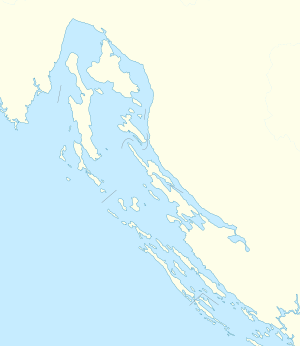Action of 1 November 1944
| Action of 1 November 1944 | |||||||
|---|---|---|---|---|---|---|---|
| Part of Adriatic Campaign of World War II | |||||||
|
Location map of Action of 1 November 1994 |
|||||||
|
|||||||
| Belligerents | |||||||
|
|
|
||||||
| Commanders and leaders | |||||||
|
|
|
||||||
| Strength | |||||||
| 2 Hunt-class destroyers | 2 Gabbiano-class corvettes, 1 Urakaze-class destroyer |
||||||
| Casualties and losses | |||||||
| none | 3 ships sunk, c. 220 killed 7 wounded 90 captured |
||||||
The Action of 1 November 1944 also known as the Ambush off Pag Island was a naval engagement in the Kvarner Gulf of the Adriatic Sea, between the islands of Pag and Lussino (present-day Lošinj) on 1 November 1944. It was fought between a British Royal Navy destroyer flotilla and a Kriegsmarine force of two corvettes and a destroyer. The German flotilla was deployed to escort a convoy retreating from Šibenik to Fiume (present-day Rijeka). The British managed to destroy all three German ships in return for no loss.
The action caused the death of more than 200 German crewmen. The attacking force rescued 90, and an additional 20 sailors were rescued two days later by German vessels sent to search for survivors. The convoy of 19 landing craft, which was expected to be escorted by the three vessels sunk by the Royal Navy, was not intercepted and it reached its destination by 2 November.
After the Italian capitulation of 8 September 1943, following the Allied invasion of Italy, the Yugoslav Partisans captured most of the eastern Adriatic coast in the region of Dalmatia. The Germans however rushed to occupy these areas particularly the northern Adriatic ports of Trieste, Fiume (present-day Rijeka) and Pula and established the Operational Zone of the Adriatic Littoral (German: Operationszone Adriatisches Küstenland – OZAK), with its headquarters in Trieste on 10 September. Since an Allied landing in the area was anticipated, OZAK also hosted a substantial German military contingent including newly formed German naval units which consisted of many captured Italian warships. As result an engagement with the Royal Navy seemed to be inevitable.
...
Wikipedia

